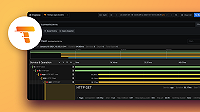Caution
Grafana Alloy is the new name for our distribution of the OTel collector. Grafana Agent has been deprecated and is in Long-Term Support (LTS) through October 31, 2025. Grafana Agent will reach an End-of-Life (EOL) on November 1, 2025. Read more about why we recommend migrating to Grafana Alloy.
Important: This documentation is about an older version. It's relevant only to the release noted, many of the features and functions have been updated or replaced. Please view the current version.
Types and values
Types
River uses the following types for its values:
number: Any numeric value, like3or3.14.string: A sequence of Unicode characters representing text, like"Hello, world!".bool: A boolean value, eithertrueorfalse.array: A sequence of values, like[1, 2, 3]. Elements within the list are indexed by whole numbers, starting with zero.object: A group of values which are identified by named labels, like{ name = "John" }.function: A value representing a routine which can be executed with arguments to compute another value, likeenv("HOME"). Functions take zero or more arguments as input and always return a single value as output.null: A type that has no value.
Numbers
River handles integers, unsigned integers and floating-point values as a single ’number’ type which simplifies writing and reading River configuration files.
3 == 3.00 // true
5.0 == (10 / 2) // true
1e+2 == 100 // true
2e-3 == 0.002 // trueStrings
Strings are represented by sequences of Unicode characters surrounded by double
quotes "":
"Hello, world!"A \ in a string starts an escape sequence to represent a special character.
The supported escape sequences are as follows:
| Sequence | Replacement |
|---|---|
\\ | The \ character U+005C |
\a | The alert or bell character U+0007 |
\b | The backspace character U+0008 |
\f | The formfeed character U+000C |
\n | The newline character U+000A |
\r | The carriage return character U+000D |
\t | The horizontal tab character U+0009 |
\v | The vertical tab character U+000B |
\' | The ' character U+0027 |
\" | The " character U+0022, which prevents terminating the string |
\NNN | A literal byte (NNN is three octal digits) |
\xNN | A literal byte (NN is two hexadecimal digits) |
\uNNNN | A Unicode character from the basic multilingual plane (NNNN is four hexadecimal digits) |
\UNNNNNNNN | A Unicode character from supplementary planes (NNNNNNNN is eight hexadecimal digits) |
Bools
Bools are represented by the symbols true and false.
Arrays
Array values are constructed by a sequence of comma separated values surrounded
by square brackets []:
[0, 1, 2, 3]Values in array elements may be placed on separate lines for readability. A
comma after the final value must be present if the closing bracket ]
is on a different line as the final value:
[
0,
1,
2,
]Objects
Object values are constructed by a sequence of comma separated key-value pairs
surrounded by curly braces {}:
{
first_name = "John",
last_name = "Doe",
}A comma after the final key-value pair may be omitted if the closing curly
brace } is on the same line as the final pair:
{ name = "John" }If the key is not a valid identifier, it must be wrapped in double quotes like a string:
{
"app.kubernetes.io/name" = "mysql",
"app.kubernetes.io/instance" = "mysql-abcxyz",
namespace = "default",
}NOTE: Be careful not to confuse objects with blocks.
An object is a value assigned to an Attribute, where commas must be provided between key-value pairs on separate lines.
A Block is a named structural element composed of multiple attributes, where commas must not be provided between attributes.
Functions
Function values cannot be constructed by users, but can be called from the standard library or when exported by a component.
Null
The null value is represented by the symbol null.
Special Types
Secrets
A secret is a special type of string which is never displayed to the user.
string values may be assigned to an attribute expecting a secret, but never
the inverse; it is not possible to convert a secret to a string or assign a
secret to an attribute expecting a string.
Capsules
River has a special type called a capsule, which represents a category of
internal types used by Flow. Each capsule type has a unique name and will be
represented to the user as capsule("SOME_INTERNAL_NAME").
Capsule values cannot be constructed by the user, but can be used in
expressions as any other type. Capsules are not inter-compatible and an
attribute expecting a capsule can only be given a capsule of the same internal
type. That means, if an attribute expects a capsule("prometheus.Receiver"),
it can only be assigned a capsule("prometheus.Receiver") type. The specific
type of capsule expected is explicitly documented for any component which uses
or exports them.
In the following example, the prometheus.remote_write component exports a
receiver, which is a capsule("prometheus.Receiver") type. This can then be
used in the forward_to attribute of prometheus.scrape, which
expects an array of capsule("prometheus.Receiver")s:
prometheus.remote_write "default" {
endpoint {
url = "http://localhost:9090/api/v1/write"
}
}
prometheus.scrape "default" {
targets = [/* ... */]
forward_to = [prometheus.remote_write.default.receiver]
}Was this page helpful?
Related resources from Grafana Labs



